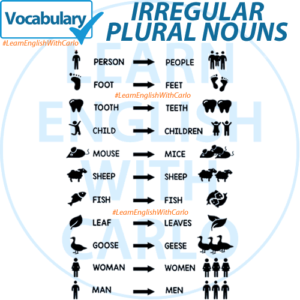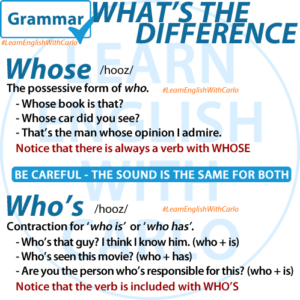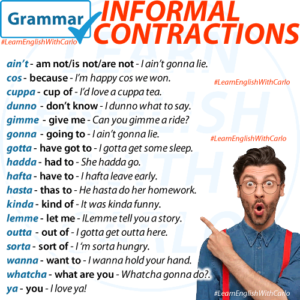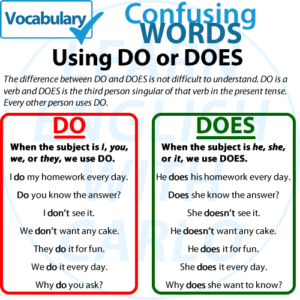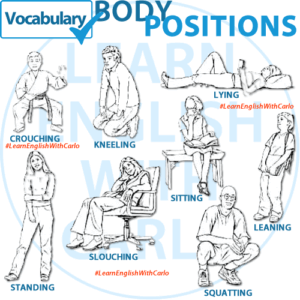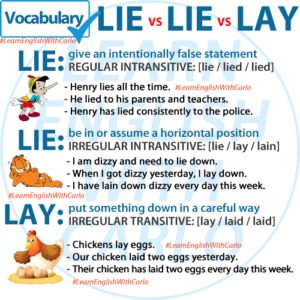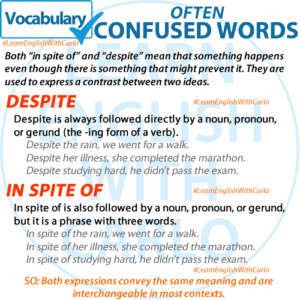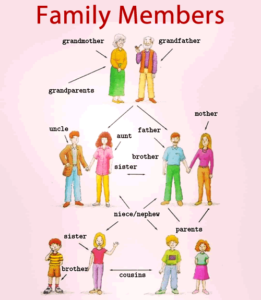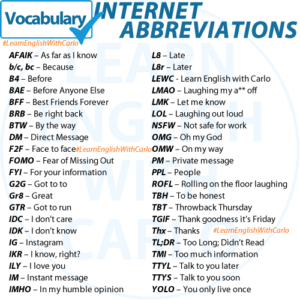VOCABULARY – Irregular Plural Nouns Most nouns in English are made plural by adding an ‘s’ to the singular form. But there are some exceptions. Here are a few of the more common ones. REMEMBER: Always use the plural verb form with plural noun subjects. FOR MORE INFORMATION ABOUT IRREGULAR PLURAL NOUNS, CLICK HERE.
Category: VOCABULARY
Permanent link to this article: https://englishyourway.com.br/vocabulary-irregular-plural-nouns/
Jun 01
WHOSE vs. WHO’S: What’s the Difference?
The words WHOSE and WHO’S may sound the same when spoken (both pronounced /ho͞oz/), but they have very different meanings and uses in English. Learning to use them correctly will help you avoid common mistakes in writing and speaking. WHOSE: Possessive Pronoun WHOSE is a possessive pronoun used to ask or talk about ownership or …
Permanent link to this article: https://englishyourway.com.br/whats-the-difference-between-whose-and-whos/
May 28
VOCABULARY – Informal Contractions
VOCABULARY – Informal (spoken) Contractions In English, as in most other languages, there are ways to shorten groups of words that commonly go together. We don’t do this in writing, just when we speak. They are called informal or spoken, contractions. ain’t – am not/is not/are not – I ain’t gonna lie. cos – because …
Permanent link to this article: https://englishyourway.com.br/vocabulary-informal-contractions/
May 18
CONFUSING WORDS – DO vs. DOES
The difference between DO and DOES is not difficult to understand.DO is a verb and DOES is the third person singular of that verb in the present tense. Every other person in the conjugation uses DO. When the subject is I, you, we, or they, we use DO. I do my homework every day.Do you …
Permanent link to this article: https://englishyourway.com.br/confusing-words-do-vs-does/
May 12
VOCABULARY – Body Positions
We place our bodies in different positions depending on what we are doing. Do you know the names of the different positions? One of my INSTAGRAM followers asked to use each one in a sentence, so here you go: Can you think of any other positions? If you have any questions or doubts, please ask …
Permanent link to this article: https://englishyourway.com.br/body-positions-vocabulary/
May 04
Lie vs. Lie vs. Lay: Understanding the Differences
English can be tricky, especially when it comes to words that sound the same but have different meanings and uses. A common source of confusion is the difference between “lie,” “lie,” and “lay.” These three words are often mixed up, but understanding their meanings and how they are used can help you use them correctly. …
Permanent link to this article: https://englishyourway.com.br/lie-vs-lie-vs-lay-understanding-the-differences/
Apr 18
DESPITE vs. IN SPITE OF
Both “in spite of” and “despite” mean that something happens even though there is something that might prevent it. They are used to express a contrast between two ideas. Structure Key Points to Remember Examples with Explanations Practice Exercise Ask your students to rewrite sentences using “in spite of” and “despite”: Visual Aid Create a …
Permanent link to this article: https://englishyourway.com.br/despite-vs-in-spite-of/
Jan 29
Commonly Confused Words
There are a lot of words in English that look or sound the same but have very different meanings, such as accept and except or affect and effect. Here’s a quick-reference list of pairs of words that sometimes cause people problems. Word 1 Meaning Word 2 Meaning accept agree to receive or do; believe except …
Permanent link to this article: https://englishyourway.com.br/commonly-confused-words-a-comprehensive-list/
Sep 25
VOCABULARY – Family Members
Permanent link to this article: https://englishyourway.com.br/vocabulary-family-members/
Sep 24
VOCABULARY – Internet Abbreviations (with definitions)
Common Internet Abbreviations in Everyday Use With the rise of online communication, abbreviations have become a fast and convenient way to convey messages. Here are some common internet abbreviations you might come across: How Abbreviations Change the Way We Communicate Internet abbreviations not only save time but also add a casual tone to conversations. They …
Permanent link to this article: https://englishyourway.com.br/vocabulary-internet-abbreviations-with-definitions/

